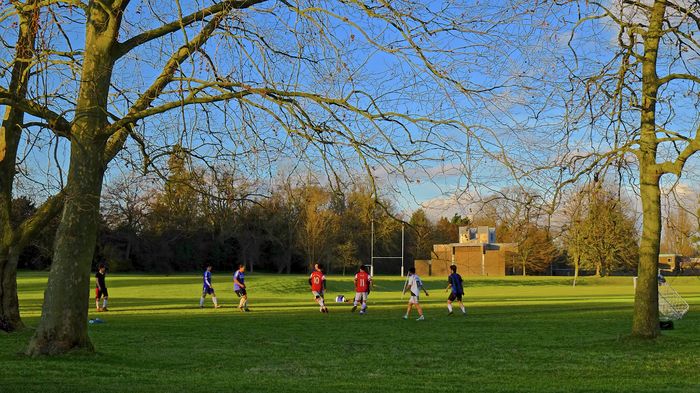Brain VS Body
Lucy Patchett explores the correlation between sporting ability and scholastic performance and considers the impact of sport on university experience and life beyond Cambridge.

Prejudices of a subtle social nature have arisen from the former attitude that those who are more talented physically lack intelligence. ‘Strong back, weak mind’ insinuates an implicit rule that strong athletes are of poor scholastic performance. Of course, top universities across the UK being able to produce highly achieving sports teams counters this idea. In fact, in a more general sense, the pendulum currently appears to swing in the opposite direction, highlighting that a positive correlation between physical ability and intelligence is undeniable. However, it is still clear that while there may be a lot of sporting talent at Cambridge, other universities produce many more athletes. But the question is why?
Training and work?
At Cambridge, we are instantly restricted by our short terms and jammed work schedules before we can even consider involving ourselves in sport at university level. For this reason, college sport is particularly valuable to students, providing the opportunity to compete at a level suitable for anyone without the high level of commitment required for Blues sports.
Regardless of the commitments we already make as students to our academics, sport at Cambridge is extremely beneficial for many reasons. In fact, committing yourself to sport (or another extra-curricular activity for that matter) often increases productivity and acts as a great way to formulate a structure of time management. Alongside the more practical reasons to engage in sport at Cambridge, it’s also been proven that sport boosts production of brain cells, relieves stress (thus increasing productivity), and triggers good moods with bursts of endorphins. Quite obviously, an increase of brain cells, stress reliever and good mood is never going to be declined by any student.
On this note, sport at Cambridge should never be frowned upon alongside an organised work schedule. In reference to other universities, it is quite obvious how, if not faced with as gruelling a work schedule, the culture of sport becomes even more appealing. Perhaps this can be said to explain why the sheer number of people who partake in university level sport is a lot higher at other universities than at Cambridge – at the latter, many of those who want to play sports engage with college activities rather than committing themselves to a university sports team schedule.
Support for student athletes
Exeter supports 450 students on their Performance Programme, Birmingham support 30 talented individuals annually with a range of tailored sports programmes, and Loughborough’s performance squad members receive thousands of pounds worth of support for coaching, strength and conditioning, nutrition, psychology and academic flexibility. These are but a few of the examples of which there are similar opportunities across the UK. While this may allude to the idea that other universities attract more accomplished athletes, this is not to say that Cambridge doesn’t receive its fair share of talent which, too, is supported by a variety of funds and performance programmes.
“An increase of brain cells, stress reliever and good mood is never going to be declined by any student.”
The Talented Athlete Scholarship Scheme (TASS), in particular, is designed to support promising athletes balancing their ambitions in sport with university education. Hundreds of student athletes benefit from these services every year, which provide lifestyle and wellbeing support for athletes in education. It is schemes like these that allow for our gifted athletes to reach their full potential while still completing their work to a high standard – in 2019-2020, 12 Cambridge students were supported by this programme.
Sport after Oxbridge
The Independent produced an article in 2013 on the advantages and disadvantages of being a high-level athlete at Oxbridge. Positives included great team camaraderie and time management skills. However, there was a continued focus on the tension between academic expectations and the demands of high-level athleticism. Organisation, communication and self-awareness seem to be the most important qualities to combat such tension.
“The average graduate who participated in sport at university earns 18% more than those who don’t.”
In fact, it has been calculated that the average graduate who participated in sport at university earns 18% more than those who don’t. The same study demonstrated that 94% of the 112 graduate recruiting companies reported that there was a “clear link between university sport participation and valuable skills and strengths in potential employees”. Evidently, the skills gained from university sport – team work, communication and leadership – are sought after by employers, demonstrating a strength of character that goes beyond academic potential.
As a university sports player, I wouldn’t say that there is anything particularly lacking in our regime. In a world free from Coronavirus, we train three times a week and have match days every Wednesday. Naturally, bonds begin to form and characters develop after so much time spent together. Sport creates a universal language and community between all universities across the UK. Whether it’s at college or university level, I would encourage everyone to have a go at some point for an abundance of reasons. College and university level sport is responsible for so many of the connections I have made so far and my time at Cambridge wouldn’t be the same without it.
 Comment / London has a Cambridge problem 23 December 2024
Comment / London has a Cambridge problem 23 December 2024 Lifestyle / Am I better than everyone? 26 December 2024
Lifestyle / Am I better than everyone? 26 December 2024 Arts / What on earth is Cambridge culture?20 December 2024
Arts / What on earth is Cambridge culture?20 December 2024 News / Cam Kong? Ape-like beast terrorises student24 December 2024
News / Cam Kong? Ape-like beast terrorises student24 December 2024 Features / Home for the holidays: bridging identities25 December 2024
Features / Home for the holidays: bridging identities25 December 2024





